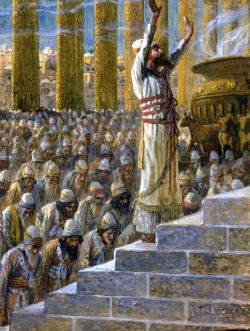"Porque de tal manera amó Dios al mundo, que dio a Su Hijo unigénito, para que todo aquél que cree en El, no se pierda, sino que tenga vida eterna."
(Juan 3:16 NBLH)
"For God so loved the world, that he gave his only Son, that whoever believes in him should not perish but have eternal life."
(John 3:16 ESV)
I decided to start with this verse (even though I had already memorized it) not because it’s the most important verse in the Bible (though it is a gooder!), but because it’s probably the best known. Some may doubt you’re actually a Christian if you don’t know this verse. 😉
Because it’s so well-known, almost every word has been analyzed and debated. Which of course reminds us that no verse can survive in a vacuum – it’s a part of a context.
If there’s one part that has caused a lot of confusion, it’s the phrase "only begotten". You’ll notice above that it doesn’t even appear in the ESV, and in the NBLH the translators included unigénito but put único in brackets (I didn’t include the bracketed words in my memorization, which are alternate translations or amplifications of the words in the NBLH).
So what’s going on? Translators have been accused of removing the words only begotten, and they’ve also been accused of adding them in the first place!
"Oneness" ministries, such as the ministries of Phillips, Craig and Dean and T.D. Jakes (although there’s been quite a debate on his stance lately), claim that "begotten" means that the Son came into being, and therefore the Trinity is not eternal. The ministry founded by Randy Phillips’ father puts it this way: The Son of God was begotten which eliminates any possibility of His having existed in heaven beforehand. The word begotten denotes "a birth"; so, the Son of God could not have existed until such time as He was born.
Before we even study the word begotten, this heretical view falls when you look at how Scripture speaks of the Son. The Bible teaches clearly that the Son was already existing with the Father in the beginning, and that He Created all things – just for starters.
The word becomes further suspect when we see how it’s used in Hebrews 11:17 – Abraham’s only begotten son Isaac. Isaac was not technically the only son born to Abraham.
So only begotten simply cannot mean that Jesus was the only Son physically born to God (Mormons have claimed that Jesus is a physical offspring of God and Mary, just as human parents give birth to children). Whatever only begotten means, it does not mean that the Son began to exist. Nor does it mean that God somehow brought about His birth to Mary as human parents give birth to a child.
But some of you with modern translations are scratching your heads, because your translations don’t even contain the word begotten. Why is that?
The reason is that most translators believe that a more accurate translation in modern English is a term that simply means "unique". For example, one of the Church Fathers, Clement of Rome, uses this word to describe the Phoenix – a mythical bird. It doesn’t have anything to do with the birth of the bird – it’s just that the bird is "in a class by itself".
Only Son (ESV), one and only Son (NET), one and only Son (NIV), only Son (GWN), only Son (NRS), one and only Son (NLT).
As far as I can tell, this understanding has been common throughout history. The translation only begotten may come from a misunderstanding of where the word in Greek (monogenes) comes from.
I’ve already gone into more detail than I intended to – but the main point is, however you translate it, this verse is not telling us that the Son started to exist, or that He is a created being, but that He was and is unique and special. There is no other like Christ – as Peter said,"There is salvation in no one else, for there is no other name under heaven given among men by which we must be saved." (Acts 4:12)
God was willing to send His Son so that believers would be saved forever. The simple and profound truth of John 3:16.


